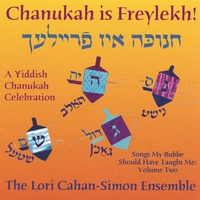"Name four great Hanukkah songs. OK, then how about two good Chanukkah songs? Not easy, huh? Adam Gardner (Guster) and Dave Schneider (the Zambonis) have taken up the important task of writing a bunch of great, rockin’ Hanukah songs." The Leevees, promotional website
"To take Hanukkah, which is a great festival that I always enjoyed as a kid singing all the songs. I remember we had this terrible record our parents played with children singing slightly off tune to a really old piano player. As the years went on, I realized they were all really bad tunes and all badly played. So the idea was to use story of Hanukkah and take some of the music of it and update it to make it really cool." Erran Baron Cohen, intervied by NY MagazineLori Cahan-Simon's got no patience for this attitude and her album "Chanukah is Freylekh! A Yiddish Chanukah Celebration. Songs My Bubbe Should Have Taught Me: Volume Two" should be considered a dope-slap and a wake-up call to contemporary Jewish musicans and fans. The album says, confidently and eloquently, that we've been at this Hanukkah music thing a while and have a huge backlog of quality material to draw from. If all you know is "I Have a Little Driedel," then you're missing out.
 Chanukah is Freylekh! is an album of Yiddish Hanukkah songs, with arrangements that center on Cahan-Simon's lovely and spirited vocals. The album arrangements have a strong klezmer and Yiddish folk feel, and Cahan-Simon does the neat trick of singing folk music professionally without turning it into theater music. Her band, including David Chernyavsky, Henry Shapiro, Alexander Fedoriouk, Adrianne Greenbaum, and Walt Mahovlich, is wonderful and, like Cahan-Simon, presents the music with confidence but without overstatement. Greenbaum's flutework in particular is a delight.
Chanukah is Freylekh! is an album of Yiddish Hanukkah songs, with arrangements that center on Cahan-Simon's lovely and spirited vocals. The album arrangements have a strong klezmer and Yiddish folk feel, and Cahan-Simon does the neat trick of singing folk music professionally without turning it into theater music. Her band, including David Chernyavsky, Henry Shapiro, Alexander Fedoriouk, Adrianne Greenbaum, and Walt Mahovlich, is wonderful and, like Cahan-Simon, presents the music with confidence but without overstatement. Greenbaum's flutework in particular is a delight.While many of the songs on Chanukah is Freylech! are new to me (which, of course, is the point of the album), Cahan-Simon ends with the popular "Oy Khanike, Oy Khanike / Oh Chanukah, Oh Chanukah." Thinking about Oy Khanike, though, brought out my one complaint with the album. Cahan-Simon wants very much to help revive Yiddish and creating this album of Yiddish Hanukkah songs is aimed to support that goal. And it is, in my opinion, a remarkable CD that should on the shelf of every Jewish library and in the CD player of every klezmer musician (and serious fan). But I wish it could be taken further. One reason that 'Oh Chanukah' has become a standard in America is the English translation. It can be sung in Yiddish, English, or Hebrew (or blends) depending on skills and interests of the singer. While Cahan-Simon's extensive liner notes offer translations, without hearing any of them sung I have a hard time imaging them gaining much traction. Which is a shame, they're lovely songs.
Here are samples from a couple of my favorites.
Ven kh’tsindt di likhtlekh on, di akht – When I Light the Eight
Drey zikh, dreydele – Spin, Little Dreydl
This is a CD to be enjoyed as well studied. You can listen to more samples and order the CD through CD Baby.








3 comments:
Many thanks for appreciating the quality of Lori's album and work in general. And mine! You've written astute comments about other records, including about my first flute-based album "FleytMuzik" (2nd was just released last July) which lends a definite credibility to your blogging about the Jewish music scene overall.
Keep up the fine work :-)
Adrianne
Thanks for this thoughtful and well-done post. I need to comment, though, that you would never insist that an opera recording or an album of music in any other language had to provide a singable translation. Let Yiddish be Yiddish.
You're right, I wouldn't. But I don't expect my family to sing opera at home, either. Lori made the same argument in a private email, saying that what I was advocating is equivalent to learning the Torah in English. Which I do advocate, as long as someone with the skills and interest can also study in Hebrew. It's not either or. I love Yiddish and want to see it gain strength. But I don't speak it and am not likely to learn it anytime soon. (Am currently working on learning Hebrew). So, what to do?
There are lots of Hebrew songs that I sing without knowing Hebrew (thought I always read the translations). But it always seems to me that the post popular Hebrew songs also have singable English versions, which help sustain their popularity. The Hebrew songs that are popular without English versions are usually very simple and taught explicitly in shul or religious school.
So what to do? In my opinion, you want to go in multiple directions at once. Work, as Lori does, at teaching Yiddish. Expose folks to Yiddish songs (as I try to do with my blog). Translate them to English to get non-Yiddish speakers to love the songs for their lyric and music.
Though I enjoy Lori's album quite a bit, I don't think it at all suggests to listeners that they could sing these songs at their own Chanukah celebration. Which, I'm afraid, means the album's ability to help inspire a love of Yiddish is minimal. And that's a shame.
Post a Comment